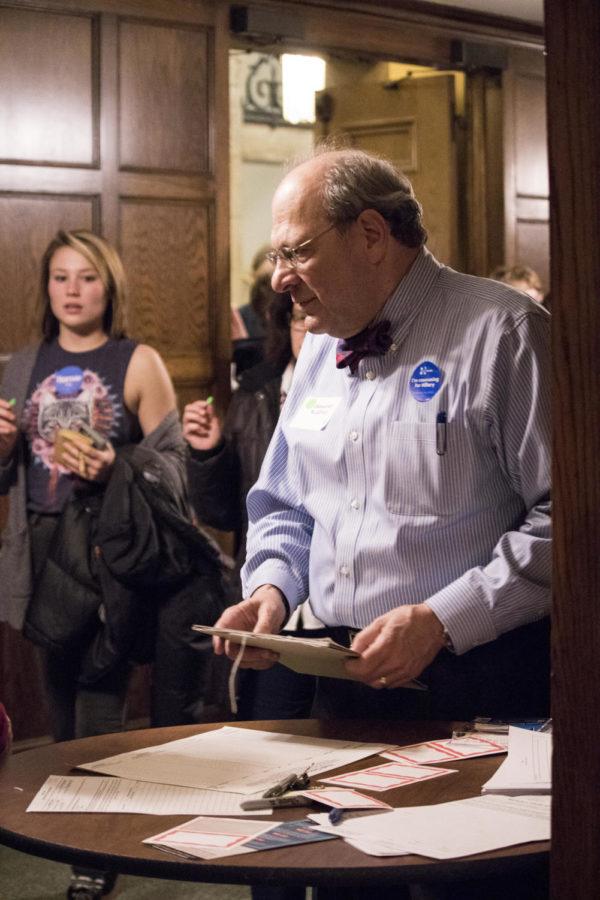Democrats’ plans for virtual caucuses seem unlikely to move forward in 2020
A caucus staffer hands out name tags to registered caucus voters Feb. 1, 2016, in the Memorial Union at Iowa State. The name tags guaranteed official caucus members were the only votes being counted.
September 2, 2019
Iowa Democrats will likely not be holding virtual caucuses in 2020, despite months of planning by the state party. The Democratic National Committee (DNC) torpedoed the work of the Iowa Democratic Party to expand access to voting in the caucuses to those unable to physically attend them.
Beginning in February, the Iowa Democratic Party began development of a means for eligible caucusgoers to register their support for a candidate via telephone.
“There is no tele-caucus system available that meets our standard of security and reliability given the scale needed for the Iowa and Nevada caucuses and the current cybersecurity climate,” the DNC said in a statement Friday.
Iowa’s caucus system requires voters to attend an in-person meeting for up to several hours on an evening in early January or February, depending on scheduling by the state. This system makes it more difficult for people without flexibility in their schedules to register their support for a candidate in the state’s first-in-the-nation presidential nominating contest.
The chair of the Iowa Democratic Party, Troy Price, released a statement in response to the DNC nixing the state party’s plans. Price said the virtual caucus represents “years of work” by party activists and volunteers to find a way to increase participation in the caucuses.
“We proposed our plan seven months ago to give us the longest ramp possible to build this system. But in that time, we know the threat landscape has changed,” Price said. “We have seen time and time again the increased threat by foreign state actors and the continued reluctance by Donald Trump and Republicans in Congress to take this threat seriously.”
Laura Belin, a progressive Iowa columnist, wrote a piece for the progressive Iowa politics blog Bleeding Heartland entitled, “Iowa Democrats should not give up on making caucuses accessible.”
“It’s not debatable: we know many politically engaged people are not able to attend for reasons including disability, work schedules, family caregiver obligations, temporary illness, aversion to crowds, or inability to drive at night,” Belin wrote. “We know that even ‘closed’ primaries (in which only registered Democrats can vote) allow for far greater participation than the Iowa caucuses as they have operated for four decades.”
In the 2016 Iowa caucuses, 186,874 Iowans registered their support for candidates in the Republican caucus and 171,109 in the Democratic caucus. Together those figures added up to a turnout rate of 15.7% of those eligible to vote.
In the June Selzer Iowa poll conducted for the Des Moines Register, Mediacom and CNN, former Vice President Joe Biden had the support of 33 percent among those who planned to caucus virtually, and 23 percent support among those who planned to caucus in person, meaning the plan to scrap virtual caucuses would seem to have an adverse effect on his campaign.

















